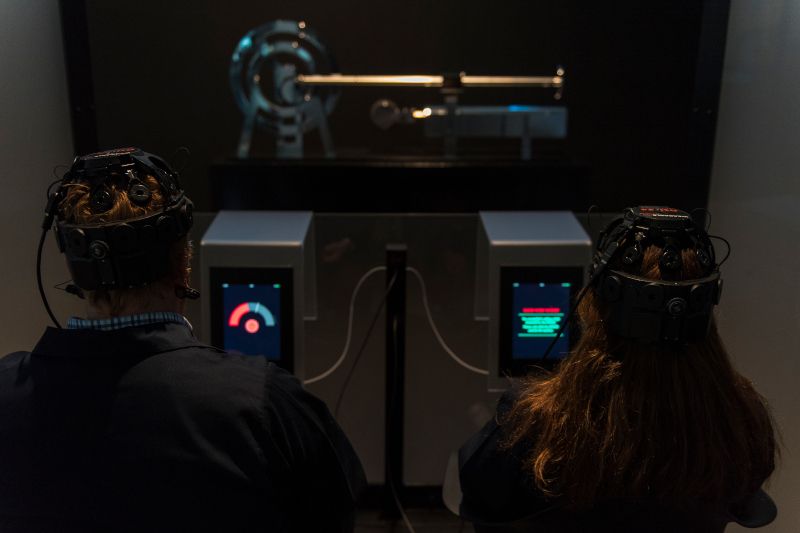Research

Neural interfaces are information technology systems that interact directly with the human nervous system to control a computer, machine or connect to the internet. They can be non-invasive, picking up signals through electrodes placed outside the body, or invasive, breaking the skin or skull barrier to implant electrodes directly into the brain or peripheral nervous system.
The Mental Work Research Platform offers a unique opportunity to explore the myriad possibilities of designing and testing new neural interfaces by creating user-centric models for neural interfaces based on user experience design. The overarching research direction is to explore how different neural interface designs can enhance a feeling of embodiment in the user: How can we improve on the sense of “being part of the machine” to augment control? Equally important is an empirical exploration of the ethical concerns that neural interfaces evoke.
Register for the User Lab
[COMING SOON]
Research directions
USER EXPERIENCE / HUMAN-MACHINE-INTERACTION
Neural interfaces are clearly an emerging topic of study for researchers of human-machine interaction. NIs have reached a level of usability that now necessitates a clear, systematic and empirical approach to the design of their interfaces. As Desney Tan and Anton Nijholt write, “(Neural Interfaces) are now mature enough that HMI researchers must add them to their tool belt when designing novel input techniques.” Yet in spite of the maturity of the technology, little has been done in creating easy-to-use neural interfaces.
One reason why NI have yet to be fully integrated into the HMI research paradigm is because of the lack of possibilities to undertake large-scale empirical iterations of interface design. As NI continue to largely remain in neuroengineering labs, where back-end algorithmic development is favored over front-end development, and tests are limited to a few engineering students and a handful of users in the clinic, there is simply not enough focus or opportunity to build robust testing conditions for the development of efficient and user-friendly interfaces. Improving the user experience of NI will have direct effects on the user’s ability to gain control over a machine using only his or her mind. Our research into new training and feedback technologies using HMI and user experience design methodologies, together with exploring the role of embodiment for improving control, could be the tipping point to bring NI to a larger public.
ETHICS OF NEURAL INTERFACES
Mental Work Research Platform for Ethical Implementation of Neural Interfaces aims to assess and mitigate several key societal impacts that the development of neural interfaces could have. We introduce users to neural interfaces through the existing Mental Work system—asking them to engage with a machine by modulating their brain activity after a short training period. They will be equipped with a state-of-the-art dry EEG helmet and given several minutes to interact with the machine without the intermediary of a physical interface. In this way, we can more actively engage them in the following themes in the form of unstructured interviews. Having just actively engaged with a neural interface, they will feel more invested in the ethical implications of the technology as it quickly develops.
Our study will look to empirically assess the public’s potential concern about neural interfaces, engaging them in conversations around these four key societal impacts concern:
- Data privacy and consent
- Individual agency and sense of identity
- Human augmentation and risk of greater inequalities
- Bias in neural interfaces
PUBLICATIONS
International and local media coverage:
➔ Reuters UK (broadcasted by +22 TV channels)➔ IEEE Spectrum
➔ Vice Motherboard
➔ Euronews
➔ Nature
➔ Wired
➔ Discovery Channel
➔ Seeker (283,000 views)
➔ Radio Télévision Suisse - CQFD
➔ Radio Télévision Suisse - Vertigo
➔ Tribune de Genève / 24 Heures
Also covered in Russia, China, France, Vietnam, Chile, and elsewhere around the world.
Team profiles

Professor at The University of Texas at Austin

UX Professor at HEIG-VD

Research Project Manager

Artist and experimental philosopher

Brain-Computer Engineer
Partners
Photos












